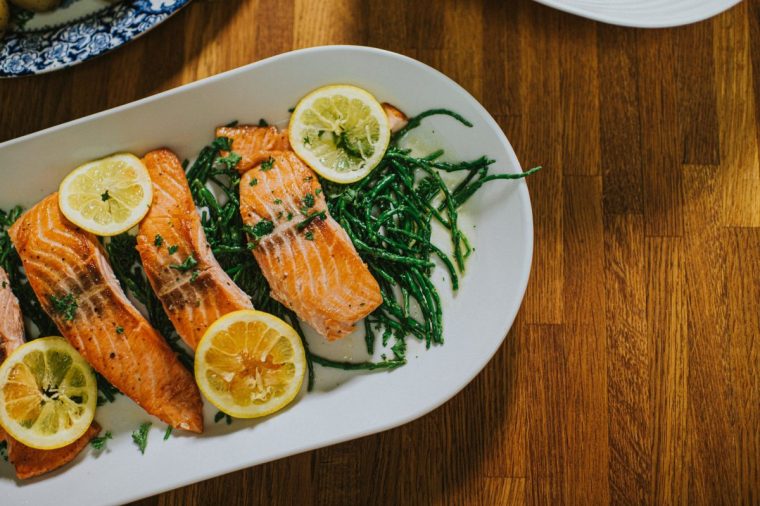Laugh
“Research shows that laughing may help boost the immune system by increasing immune cells and infection-fighting antibodies. Other studies show that laughter causes a significant reduction in cortisol levels, the stress hormone. This is beneficial to immunity because chronically high cortisol levels can lead to inflammation and a weakened immune system. So, consider increasing your time spent laughing each day by watching a funny film, reading a funny book or prioritise spending quality time with people who make you laugh.” Abbas Kanani, pharmacist at Chemist Click
Get dirty
“Being outdoors in nature, getting your hands dirty, gardening and doing other outdoor tasks is all beneficial for your immune system. We know this from the ‘old friends hypothesis’, which suggests that exposure to organisms in early life primes the immune system for a better response in adulthood. Studies also show that people living in rural areas have a lower incidence of allergies. Getting out in nature means exposing yourself to soil-based organisms (SBO), which help plants grow, but reseach shows also have positive health benefits for humans.” Dr Deborah Lee, GP and medical consultant at Dr Fox Online Pharmacy
Eat something prebiotic
“Seventy per cent of the immune system is found in the gut, and prebiotic foods help to the gut happy by feeding the healthy bacteria located here. Foods high in inulin are particularly beneficial, such as leeks, onions, garlic, asparagus, avocado, chicory, artichoke, bananas and apples. They enable our gut bacteria to make nutrients which help to strengthen the immune system.” Debbie Grayson, pharmacist, nutritional therapist and founder of Digestion With Confidence
Breath through your nose
“Breathing through the nose, as opposed to the mouth, offers several health benefits. The nasal passages filter harmful particles like dust and bacteria from the air, protecting the lungs. Nasal breathing also increases nitric oxide production, a molecule that has powerful antimicrobial and vasodilatory effects, which enhances circulation and immune response. This type of breathing improves oxygen absorption, which in turn supports better respiratory health and oxygen delivery to cells. By activating the parasympathetic nervous system, nasal breathing promotes relaxation and reduces stress, helping regulate the immune system and enhance the body’s ability to fend off pathogens.” Sebnem Unluisler, chief longevity officer and genetic engineer at the London Regenerative Institute
Strength train
“Resistance training not only strengthens muscles but also supports healthy body function, including the immune system. Muscles produce and release proteins called myokines when they contract, which have anti-inflammatory effects and can regulate immune function. By improving muscle mass, you help the body better handle immune challenges and fight off infection more efficiently. Incorporate exercises like squats, lunges, push-ups, resistance band work, or weightlifting into your routine. You don’t need heavy weights -bodyweight exercises or light resistance can still trigger these positive effects on immunity.” Rowan Clift, training specialist at fitness and lifestyle app Freeletics
Drink herbal tea
“Many herbal teas can support the immune system and reduce inflammation. Two highly beneficial teas are lemon balm tea and holy Basil (Tulsi) tea. These two teas are good for stress and sleep which in themselves can support the immune system. They are also antimicrobial and can help with bacterial, viral and fungal infections too. Chronic inflammation can impair the body’s ability to fight infection, turmeric and ginger are highly anti-inflammatory and make a good herbal tea to add into your daily routine.” Debbie Grayson

Stretch first thing
“Incorporating gentle stretching or mobility work as soon as you wake up helps activate the lymphatic system, which is essential for removing toxins and supporting immunity.” Lucie Cowan, master trainer at Third Space studio
See some loved ones
“Engaging in meaningful social connections has profound effects on both mental and physical health, particularly on the immune system. Social bonding and relationships trigger the release of oxytocin, a hormone that plays a key role in reducing stress and fostering trust and emotional closeness. Oxytocin, often called the ‘love hormone’, is also known to have anti-inflammatory properties, helping to counteract the effects of stress hormones like cortisol. Chronic stress weakens the immune system by increasing inflammation and reducing the production of white blood cells, making the body more susceptible to illness. Social support mitigates these effects, promoting immune resilience.” Dr Tom MacLaren, consultant psychiatrist at Re:Cognition Health
Exercise snack
“Exercise not only activates immune cells and gets them circulating throughout your body, but it also extends their presence for up to three hours post-exercise. This prolonged window allows your immune cells more time to detect and combat potential threats, helping to reduce the risk of illness. Something simple that everyone can incorporate into their day for immune-boosting benefits is ‘exercise snacking’. This refers to short bursts of exercise throughout the day to boost your circulation and immune cells.” Annabel Luke, nutritionist, personal trainer and Pilates instructor
But balance it with rest
“While exercise can stimulate immune function, overtraining can lead to immune suppression. Pushing your body too hard, especially without proper recovery, leads to the production of stress hormones like cortisol, which suppresses the immune system. Over time, this can make you more vulnerable to illness. Schedule rest days in your workout plan to allow your muscles and immune system to recover.” Rowan Clift

Eat iron-rich foods
“Iron is essential for a healthy immune system, playing a key role in promoting the growth of immune cells, particularly lymphocytes, which help the body fight off infections. Without sufficient iron, the body becomes more vulnerable to illness as the immune response weakens. Common signs of low iron, such as fatigue, weakness, and frequent infections, can be red flags that your immune system is compromised. To maintain healthy iron levels, incorporate iron-rich foods into your diet. Liver, red meat, poultry, and fish are excellent sources of heme iron, the type of iron most easily absorbed by the body. Plant-based sources such as lentils, chickpeas, and spinach, contain non-heme iron, which is still beneficial but is better absorbed when paired with vitamin C-rich foods like citrus fruits, peppers, and tomatoes.” Jen Walpole, nutritional therapist
Break up time sitting
“Avoid sitting for prolonged periods by taking breaks to stretch, walk, or do light movements. Staying active throughout the day helps regulate immune responses and prevents sedentary-induced health risks.” Lucie Cowan
Gargle salt water
“Gargling with salt water daily can be a simple, effective way to support oral and throat health, contributing to overall immune defence. Saltwater acts as a natural disinfectant. It can help clear away mucus, reduce inflammation, and create an environment hostile to bacteria and viruses in the throat and mouth. By keeping the throat clean and reducing potential infection sites, this routine may lower the risk of respiratory infections, particularly colds and sore throats. Additionally, the salt solution helps to draw out fluids from inflamed tissues, promoting faster healing.” Suzanne Wylie, GP and medical adviser for IQdoctor
Go to bed and get up at the same time every day
“The body thrives on routine, especially when it comes to sleep. Ensuring you get seven to nine hours of rest each night is essential not only for feeling refreshed and energised, but also for your immune system. During deep sleep, your body goes through important repair processes that help keep you healthy. To make the most of this, it’s helpful to go to bed at similar times each night and wake up at the same time each morning. A calming bedtime ritual, such as reading, stretching, or meditation, can also improve the quality of your sleep and help you wind down, making it easier to drift off.” Gabriela Peacock, celebrity nutraceutical expert, and founder of GP Nutrition
Use natural surface cleaners
“Many commercial cleaning products contain harsh chemicals that can affect our immune system over time. Try making your own surface cleaner using natural ingredients like vinegar, lemon juice, or hydrogen peroxide. This way, you can effectively clean surfaces without exposing yourself to unnecessary chemicals.” Dr Elise Dallas, GP at The London General Practice
Practise digital detoxing
“Scientists have found that those with heavy internet usage had 30 per cent more colds than those with low usage. High internet usage is also linked to higher stress levels and poor sleep. Both of these negatively affect the immune response. In this study, high internet users also smoked more and drank more alcohol, both of which also lower immunity.” Dr Deborah Lee
Head outdoors
“Outdoor exercise has the added benefit of exposing you to natural sunlight, which is crucial for maintaining adequate Vitamin D levels. Vitamin D plays a vital role in immune regulation and helps your body respond effectively to pathogens. Many people are deficient in vitamin D, particularly in winter, which can leave them more vulnerable to illnesses. Spend time outdoors during daylight hours—try activities like walking, hiking, or cycling in a park or nature reserve.” Rowan Clift

Spend time with pets
“Interactions with animals seem to boost our immunity. Petting a dog or a cat has been shown to raise levels of IgA immunoglobulins in human saliva. These antibodies are found at mucosal surfaces and help defend the body from infecting organisms. Meanwhile, being around animals is known to lower levels of the stress hormone, cortisol, which is well known to impair the immune response.” Dr Deborah Lee
Take an evening walk
“A slow, calming walk in the evening can help lower cortisol levels and support recovery, setting the stage for better sleep and immune repair overnight. This also aids in digestion and helps to reset the body’s natural rhythms.” Lucie Cowan
Eat citrus fruit
“Citrus fruits are rich in key immune supporting nutrient Vitamin C, which is thought to increase the production of white blood cells which are important for fighting infections. Kiwi fruit is a really great choice, as are red peppers, as they are one of the richest food sources of Vitamin C.” Maz Packham, nutritionist and consultant at W-Wellness
Maintain proper dental hygiene
“Studies have confirmed that not brushing your teeth properly leads to the build-up of plaque – a type of biofilm – which causes gum inflammation and general inflammation in the mouth. Mouth inflammation is strongly linked to systemic inflammation and consequent dysregulation of the immune system. The British Dental Association (BDA) recommends cleaning your teeth at least twice a day, for two minutes at a time, using fluoride toothpaste.” Dr Debroah Lee
Eat some fibre
“Fibre is an essential nutrient to promote healthy digestion and encourage the growth of beneficial gut bacteria, which in turn supports the immune system. An affordable way to weave more fibre into your diet is to swap sugary breakfast cereals for wheat biscuits or bran flakes, or add peas, beans or sweetcorn to evening meals.” Dr Carrie Ruxton, nutritionist and dietitian
Optimise your sleep
“Getting less than six to eight hours of quality sleep is associated with reduced immune response to infection. Ideally, we should aim to sleep between 10pm and 6am for optimal health. Our sleep hormone melatonin helps to control our sleep and if production is low then sleep duration and quality can be affected. Blue light from technology can block the production of melatonin, so disconnecting from technology at least two hours before bed can improve sleep quality. Also, getting outside in daylight within 30 minutes of waking can help with control of the circadian rhythm, our sleep-wake cycle.” Debbie Grayson

Hydrate with natural electrolytes
“Drink two litres of water per day to boost hydration and, even better, add natural electrolytes such as Celtic Sea Salt, lime, ginger or mint, served warm or at room temperature, instead of ice cold. Drinking water with electrolytes can help boost your immune system by maintaining the body’s acid-base balance and positively affecting white blood cell development. Hydration is super important because being dehydrated can weaken your immune system and make you more vulnerable to illness.” Dr Simone Laubscher, nutritionist at WelleCo
Taste the rainbow
“Eat colourfully every day is a great way to cultivate healthy immune systems. You can do this by eat five portions of fruit and vegetables every day. Try adding blended or grated vegetables into pasta sauces, or bananas to sweeten desserts. Buying frozen veggies and fruit is an affordable way to preserve key ingredients for longer.” Dr Carrie Ruxton
Pass up that extra drink
“You may feel you need or deserve an extra tipple, but so often it can topple your immune system into disarray. Alcohol can blunt your immune system function by affecting the structure and integrity of the gut. It can also have an injurious effect on liver antiviral immunity. Key to excessive reliance on alcohol is having attractive alternatives, so experiment with mocktails and the many non-alcoholic aperitifs to ensure you have a cheery glass in your hand when you need a treat that won’t dampen your immune cells.” Alison Cullen, nutritional practitioner at avogel.co.uk
Manage stress with a five-minute breathing exercise
“Chronic stress makes your body produce too much of the stress hormone cortisol. Excessive amounts of cortisol suppresses the immune response and reduces how many infection fighting white blood cells we make. When stressed, try some box breathing – inhale for four seconds; hold for four seconds; exale for four seconds; hold for seconds and repeat. It can take less than five minutes can calm the stress response and reduce the amount of cortisol the body produces.” Debbie Grayson
Only wash your hands at key times
“Cultivate good hygiene habits Such as frequent handwashing with soap and water, avoidance of close contact with sick individuals, and proper etiquette when coughing or sneezing to prevent the spread of germs. While it’s important to wash our hands regularly, excessive hand washing can strip away the natural oils and beneficial bacteria on our skin. Instead, focus on washing your hands at key times such as before eating, after using the restroom, and after coming into contact with surfaces that may harbour germs.” Dr Elise Dallas



'President Musk' is flexing his muscles and revealing how weak Trump is